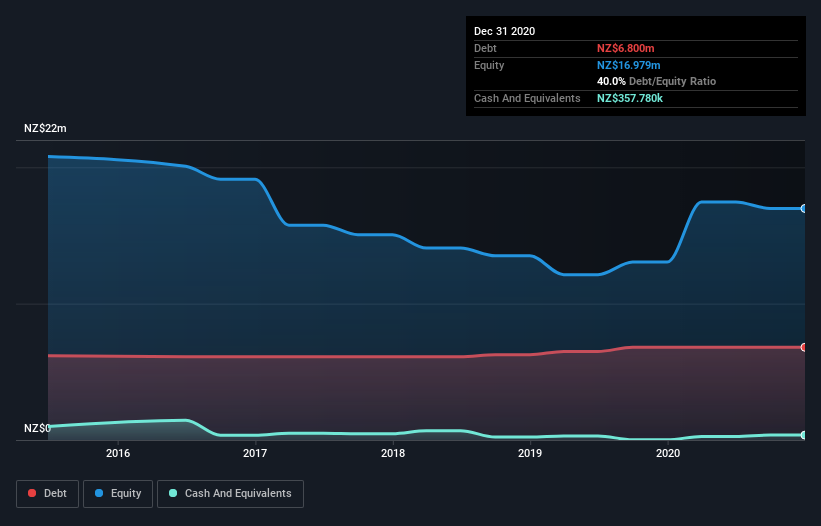- New Zealand
- /
- Beverage
- /
- NZSE:MWE
Marlborough Wine Estates Group (NZSE:MWE) Is Carrying A Fair Bit Of Debt

The external fund manager backed by Berkshire Hathaway's Charlie Munger, Li Lu, makes no bones about it when he says 'The biggest investment risk is not the volatility of prices, but whether you will suffer a permanent loss of capital.' It's only natural to consider a company's balance sheet when you examine how risky it is, since debt is often involved when a business collapses. As with many other companies Marlborough Wine Estates Group Limited (NZSE:MWE) makes use of debt. But the real question is whether this debt is making the company risky.
When Is Debt A Problem?
Generally speaking, debt only becomes a real problem when a company can't easily pay it off, either by raising capital or with its own cash flow. In the worst case scenario, a company can go bankrupt if it cannot pay its creditors. However, a more common (but still painful) scenario is that it has to raise new equity capital at a low price, thus permanently diluting shareholders. Having said that, the most common situation is where a company manages its debt reasonably well - and to its own advantage. The first step when considering a company's debt levels is to consider its cash and debt together.
See our latest analysis for Marlborough Wine Estates Group
What Is Marlborough Wine Estates Group's Net Debt?
The chart below, which you can click on for greater detail, shows that Marlborough Wine Estates Group had NZ$6.80m in debt in December 2020; about the same as the year before. However, it does have NZ$357.8k in cash offsetting this, leading to net debt of about NZ$6.44m.

How Strong Is Marlborough Wine Estates Group's Balance Sheet?
The latest balance sheet data shows that Marlborough Wine Estates Group had liabilities of NZ$7.67m due within a year, and liabilities of NZ$2.34m falling due after that. On the other hand, it had cash of NZ$357.8k and NZ$505.9k worth of receivables due within a year. So its liabilities total NZ$9.15m more than the combination of its cash and short-term receivables.
Given Marlborough Wine Estates Group has a market capitalization of NZ$85.9m, it's hard to believe these liabilities pose much threat. Having said that, it's clear that we should continue to monitor its balance sheet, lest it change for the worse. The balance sheet is clearly the area to focus on when you are analysing debt. But you can't view debt in total isolation; since Marlborough Wine Estates Group will need earnings to service that debt. So when considering debt, it's definitely worth looking at the earnings trend. Click here for an interactive snapshot.
In the last year Marlborough Wine Estates Group wasn't profitable at an EBIT level, but managed to grow its revenue by 13%, to NZ$6.8m. That rate of growth is a bit slow for our taste, but it takes all types to make a world.
Caveat Emptor
Over the last twelve months Marlborough Wine Estates Group produced an earnings before interest and tax (EBIT) loss. To be specific the EBIT loss came in at NZ$135k. When we look at that and recall the liabilities on its balance sheet, relative to cash, it seems unwise to us for the company to have any debt. Quite frankly we think the balance sheet is far from match-fit, although it could be improved with time. On the bright side, we note that trailing twelve month EBIT is worse than the free cash flow of NZ$398k and the profit of NZ$181k. So one might argue that there's still a chance it can get things on the right track. When analysing debt levels, the balance sheet is the obvious place to start. However, not all investment risk resides within the balance sheet - far from it. Be aware that Marlborough Wine Estates Group is showing 5 warning signs in our investment analysis , and 1 of those doesn't sit too well with us...
If you're interested in investing in businesses that can grow profits without the burden of debt, then check out this free list of growing businesses that have net cash on the balance sheet.
When trading stocks or any other investment, use the platform considered by many to be the Professional's Gateway to the Worlds Market, Interactive Brokers. You get the lowest-cost* trading on stocks, options, futures, forex, bonds and funds worldwide from a single integrated account. Promoted
New: Manage All Your Stock Portfolios in One Place
We've created the ultimate portfolio companion for stock investors, and it's free.
• Connect an unlimited number of Portfolios and see your total in one currency
• Be alerted to new Warning Signs or Risks via email or mobile
• Track the Fair Value of your stocks
This article by Simply Wall St is general in nature. It does not constitute a recommendation to buy or sell any stock, and does not take account of your objectives, or your financial situation. We aim to bring you long-term focused analysis driven by fundamental data. Note that our analysis may not factor in the latest price-sensitive company announcements or qualitative material. Simply Wall St has no position in any stocks mentioned.
*Interactive Brokers Rated Lowest Cost Broker by StockBrokers.com Annual Online Review 2020
Have feedback on this article? Concerned about the content? Get in touch with us directly. Alternatively, email editorial-team (at) simplywallst.com.
About NZSE:MWE
Slight with mediocre balance sheet.


